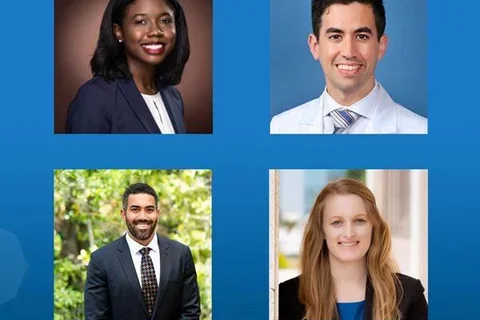Bruin Scholars Program Seeks to Retain Providers Committed to Inclusive Excellence Values

The Bruin Scholars Program, launched by the Office of Inclusive Excellence (OIE) at the David Geffen School of Medicine and Dean’s Office, promises mentorship and funding for trainees transitioning into faculty positions.
The program, which launched in early 2023, was created to retain trainees who are committed to uplifting underserved populations to become faculty.
“This program is a step in the right direction in meeting historically ignored and structurally vulnerable populations needs,” says Melanie Bonilla, program coordinator for the Office of Inclusive Excellence. “I think it speaks to the work that our junior faculty – and faculty generally, are committed to.”
Scholars are nominated by their department chair, program director and mentor. Funding for the program comes from the Office for Inclusive Excellence, Dean’s Office, and the respective awarded departments, totaling to $200,000 across two years. Scholars and applicants are offered access to the Junior Faculty Academic Mentorship (JFAM Council), a one-year period of mentoring, training, coaching, and networking opportunities.
The Bruin Scholars Program will accept nominations annually, beginning mid-October 2023 with a deadline of early January 2024. All awardees will be announced early February 2024.
Meet the inaugural cohort 2023 scholars:
Juan Andino, MD, MBA, is a UCLA Male Reproductive Medicine and Surgery Fellow.
“I feel very fortunate to say that the stars have aligned. I’m going to have my dream job and my wife gets to keep working as an OBGYN at Harbor-UCLA Medical Center, working in a really underserved community, which she loves. As part of this position, I’m able to focus on something that I pursued in residency, which is mentorship for underrepresented minorities (URM) in medicine, and I’ll even have some protected time and funding to be able to study disparities in urologic care,” says Dr. Andino.
Dr. Andino’s three project focus areas are: 1. mentorship development for underrepresented students, similar to the infrastructure that exists for University of California-wide integrative summer research program in Urology 2. Data collection and research to understand barriers to urologic care for patients at Martin Luther King, Jr Community Hospital, building off the work of former UCLA Urology fellow Dr. Denise Asafu-Adjei, and 3. Health policy and advocacy efforts at local, state and national levels to improve access to care, including leveraging telehealth at UCLA and MLK.
“Sexual function and male fertility are two areas that are known to have limited insurance coverage in the United States. The Bruin Scholar program presents an incredible opportunity for continuing to grow clinically and surgically, while providing the bandwidth to address and answer some key questions about why there are these huge barriers, including financial, to men accessing care that is important to their quality of life.”
Jane Fazio, MD, UCLA Pulmonary and Critical Care Fellow
Throughout her education, Dr. Fazio sought out medical programs which offered continuity clinics, or practices structured to prioritize continuous chronic disease management, particularly serving underrepresented populations.
“It’s one of the reasons why I chose UCLA,” she says of the research infrastructure working with undocumented Latino immigrants, “not to mention the training program is 40 percent women, which is really rare in my specialty. There are similarly high numbers of women faculty in my division, many in leadership roles, too.”
Working in a continuity clinic at Olive View-UCLA Medical Center, Dr. Fazio will focus her research efforts on a preventable, rare and ancient lung disease, Silicosis, plaguing primarily young Latino men in the stone fabrication industry.
Shenise Gilyard, MD, UCLA Vascular and Interventional Radiology Fellow
“When I interviewed at UCLA, it just felt special. It felt like a place where people were just so excited about the science of patient care and dedication to excellence that I hadn't seen as well displayed at other institutions,” Dr. Gilyard says. “After I finished my interview, I remember writing on the notepad, ‘this feels like home.’”
Her work will target health care disparities in the population served at Martin Luther King Jr Community Hospital. One area she’s interested in improving is the quality of life for patients with sickle cell disease through interventional radiology care and hematology.
“Having programs like the Bruin Scholar Program are important because it puts people with a long track record of dedication to historically ignored populations to truly intervene on the diseases that disproportionately affect those people that have been overlooked,” Dr. Gilyard says.
Chase Richard, MD, MBA, Chief Resident Physician, UCLA Emergency Medicine
Dr. Richard says he was nervous making the transition to Los Angeles from his native San Francisco Bay Area, but those fears quickly vanished when saw that the folks in the UCLA Emergency Medicine Department understood that people were their most important asset.
“They were really interested in me having the opportunity to continue working on the Equity, Diversity and Inclusion and Innovation projects I was passionate about. They wanted me for me,” he says.
Dr. Richard’s work intends to explore solutions to health disparities through the UCLA Biodesign Program.
“What I'm working on now is the UCLA Health TechQuity Accelorator, trying to address health inequity through different means – whether it be improving language accessibility issues, or creating paths for those who may not have a voice for themselves, such as youth. It could be youth well-being challenges, mental health challenges, financial, physical, or socioeconomic challenges. We are trying to create solutions to those problems and learn how we, as an institution, can help support early-stage companies in creating meaningful change for vulnerable populations.”
Sign up for the Meet the Inaugural Bruin Scholars event to learn more about each scholar and their research.
Original Article: "Bruin Scholars Program seeks to retain providers committed to Inclusive Excellence values"



